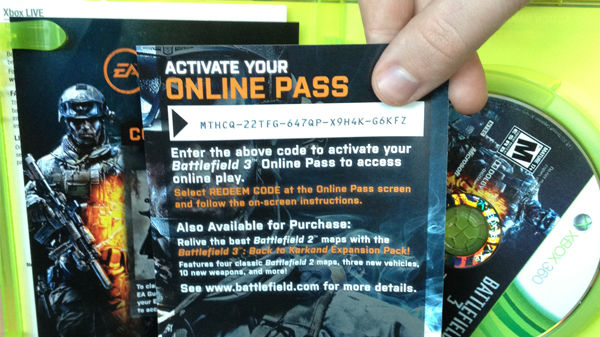Originally conceived in 2010, the Online Pass scheme - also known as 'Project $10' - was a way for companies such as EA to recoup some money from used game sales. You see, when you buy a game brand new, the games' developers and publishers both get a cut of the profits - but when you buy second hand, the money goes straight into the pocket of the store you bought it from. As games got shorter, and their prices remained high, many began trading games in as a way to offset the cost of buying new releases. But with a huge selection of nearly-new games available, at a cost that was often orders of magnitude less than buying new, publishers began to worry about how many potential sales were being "lost", to second hand games. The solution, as they saw it, was to lock the multiplayer side of things with an "online pass" - supplied as a single use code, the system essentially meant that only the first person to buy the game could access the online side of things - if you bought it second hand, you'd have to pay $10 to unlock the online play. Other publishers went further still, locking not only online play, but offline features too - Driver: San Francisco locked its replay mode, and Dirt: Showdown blocked access to YouTube sharing.

Booo! Hiss!
So you can imagine our surprise when news broke today that EA, the pioneers of the online pass system, are set to be scrapping them for all future releases. It's certainly come somewhat out of the blue, with the official reason being given that scrapping the program is a "direct result of players' responses" - although why it's taken three years to renege on it is anybody's guess. And while the original reason for starting to program was that the money was essential server maintenance and development, EA's senior corporate communications director John Reseburg has declared that they're "still committed to creating content and services that enhance the game experience well beyond the day you first start playing".
In all, it does seem something of a rash decision from EA, as despite widespread customer disapproval, their games still went on to sell huge numbers - as proven by the sales figures for each iteration of the Fifa franchise alone. In fact, revenue for online passes alone netted EA somewhere between $10 and $15 million in 2010, and that was before it escalated from just sports titles to every EA game going. All things considered, the more cynical amongst us may suspect that there's another reason for the backtracking, which may well rest at the feet of the next generation. Rumours were rife that the new Xbox and Playstation would somehow block used games, and while Sony have issued a statement to say that won't be the case, Microsoft have made no such comments - and when you consider that Microsoft and EA have been chummy since the early days of the 360, there's a distinct possibility they've only dropped the online passes because the next console(s) will effectively make them redundant.
EA weren't the only company using the controversial system, though, with games from both Codemasters, Ubisoft, THQ and Sony coming with single-use codes too - although there's no news on whether other publishers will now be pressured to drop them too. EA also didn't disclose which of their games would be the first to come without a single-use code, although they did suggest that from this point forward no more online passes would be included - we'll have to wait and see whether the dreaded piece of paper makes it's appearance this autumn in Fifa 14 then.













